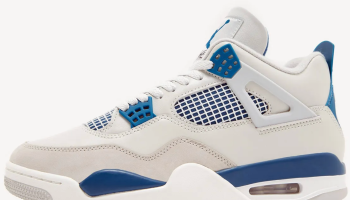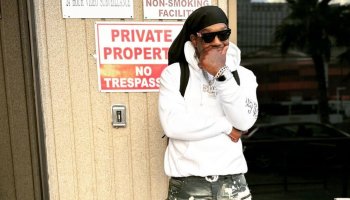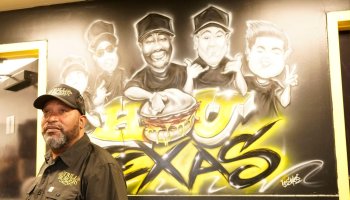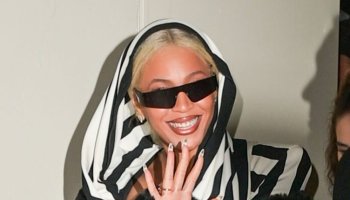The plight of a Black woman takes new heights when she takes part in the time old tradition of going to a beauty supply store.
Millions of us have the same story of being followed watched and monitored in the stores often by people who know nothing about us or our fascination with the very product they sell.
Chris Rock recently highlighted the struggle of Black women to maintain and obsess over something as simple as tresses in his film “Good Hair” and while Chris made his point on the big screen, another man is stepping up to do the same in communities nationwide.
Although he has less notoriety and less fame, Professor and Black activist Devin Robinson has started a national boycott of non-Black owned beauty supply stores to send a message. The message he hopes to send is one of equal treatment, one of fair distribution and one that can ultimately pump millions of dollars back into the Black community. This Black beauty supply owner and founder of “Taking It Back Black Campaign” schools men and women on the skills needed to successfully own and operate their own store.
If this is your first time hearing about the boycott it’s not too late to join in, you have until November 22 to “go against the grain” and take your business where it is appreciated. Hell, if these discriminatory practices really infuriate you, why not extend it? Professor Robinson sat down with HipHopWired to tell us what motivated him to start the boycott, the huge economic implications it could bring and exactly what we can do to help.
HipHopWired: How did you really get into the beauty supply industry, did you hear about the struggles Black women go through your wife or daughter?
Devin Robinson: No, What happened was, I got thrown out of a beauty supply store. I owned a barber shop and a salon and I was in there shopping for supplies, I was prepared to spend about a thousand dollars that day and because I was browsing the guy didn’t like it, it was a Korean guy, he grabbed a golf club and threatened me and kicked me out of his store. I left quietly, caught me on a good day. I left and sat in front of my salon, and said I got to do something about that. I don’t think that’s right. I am a professional business person, how is he treating the younger people the less fortunate people, maybe dressing a little more intimidating or aggressive than I was that day. And I decided to open my store, I called the landlord who had my salon I said listen I want a beauty supply store right next to my shop, I paid them 5,000 dollars that day, I didn’t have no experience, no industry experience no contacts, nothing, I assumed like any business, you got the money you can get in. That’s not the case. That’s when I really learned what it was about.
HipHopWired: So how do you go about being successful in the beauty supply industry?
Devin Robinson: First you got to know business, that’s the first thing. You got to know how to run a good business, you got to cater to your business, many special occasions I missed, many vacations I missed, that’s the first thing you need to do is learn to sacrifice. And then once you get in, customer service and persistence is really what made me successful. There was some products that I wanted I had to get it, when I opened my store, it took me 4 to 6 months to get wigs. Distributor would not sell me there hair.
HipHopWired: You would call them and they’d say no?
Devin Robinson: They wouldn’t come out and say no, they would say here’s our fax number and download these forms we get back to you and you’d never hear from them……I eventually started getting call backs and I call and say I’m calling on behalf of Ms. Kim, she’s the owner of the business, call me back, I started getting phone calls……then one thing that really worked for me, I lived in Korea for a year in the mid 90s, so I know the food, the culture, and when I got to different distributors I would befriend them using that……they let me in and let their guard down, not knowing they were letting their guard down for the wrong person.
HipHopWired: What was the final straw for you in the hair business when you decided to do the boycott?
Devin Robinson: I opened the stores I sold them to other black people. I appeared in the black hair DVD in a documentary in 2007, they filmed my store and they were like this young guy is doing this. I had a scene on there where I had people emailing calling me about help. So I decided to write a book, “Taking It Back: How to Become a Successful Black Beauty Supply Store Owner.” After I did that I wound up being on Michael Baisden several times, I’ve been on his show six times since then. I was featured in Ebony magazine in 2008 and when that happened, more calls came in of people needing help. So I decided that I needed to sell my store so that I could really help people get into this business. Being a business store owner I’m in the trenches. It’s harder for me to help anyone when I’m fighting my own battle. So I decided to sell it to other Blacks and I started the crusade, started the University, started the courses and started traveling. I was teaching people how to set their own stores up.
HipHopWired: The boycott is from November 16 through the 22. So really break it down for me. Are there certain products we shouldn’t buy? Or in general just go to Black owned stores?
Devin Robinson: Here’s what we gotta do. Where the problem really lies is in the distributors. There’s really only one full scale Black distributor in the country everyone else is Asian. That’s part of the problem. We got Luster’s, we got Dudley’s, Bonner Brothers, they manufacture so we still have some Black manufacturers out there but when those products get shipped to the distributor that’s where they decide to channel it to the Asian stores. That’s where they sell it to the Black stores at higher prices and give them the run around. So they’re sending their products to the Asian stores and we’re having a hard time. What I’m planning to do is send people to the Black owned stores only. If we shop at Black owned stores only, these distributors are only going to get orders from Black owned stores. They’re going to start to see a decline in sales at the Asian stores and if they can realize that wait a minute, we have that power and that leverage they will have no choice then but to open up the books and operate fairly to the Black owned stores. They may not do it in just that one week but I’m prepared to do it make this one week into two weeks and into a month as we move forward. I want to start with a week, small successes so businesses can see. We’re talking about $66 ½ million a week so if we do this one week that’s $66 ½ million going to the Black community. That’s really what I’m trying to do, send a message to the distributors that you need to open the doors and operate fairly. You got a Black retailer coming to you? You need to operate fairly.
HipHopWired: What about the people that don’t think it’s a big deal that we don’t own the beauty supply stores that say I don’t care, I’m going to go to the same beauty supply store I always go to.
Devin Robison: See that’s part of the problem. That’s been part of our problem historically. We haven’t seen 100% cooperation in pretty much anything that we’ve done. It’s gotta become viral. You do have those people who are price sensitive but once they see a cause and people start to see that the support is spreading I think that people will get on board and see that once we hand our money to the Asian owner we’re sending that money directly out of our community. So you may be sending less for that item or transaction but you’re spending way more in the big picture. Now you have no tax revenues. You have deplorable conditions in your churches, in your schools and you have crime because we don’t have the tax revenue to bring police officers out. We start to pay a price for that. You pay a price because you gotta pay for security systems for your homes. We pay on the back end in having a crime infested community because of the lack of revenue circulating in that community.
HipHopWired: How do you plan to market this on a National level?
Devin Robinson: The press releases are going out we’re still trying to get the attention of national media and syndicated shows. A lot of people in the local circuits are picking up the story. I’m very proud, I’m happy about that. If we could get CNN and MSNBC on board it’s a long shot but if we could get them to cover the stories that’d be great. Right now we have the support of Reverend Al Sharpton, Michael Baisden, Warren Ballentine, these are people that are promising to cover the boycott for that entire week. I don’t have a national platform; I’ve never had a national platform. So I’m just working with the media friendly folks that will open the doors and get this message out. That’s what I’m relying on.
HipHopWired: Is there a directory for the Black beauty supply stores so people can find out where they are in their area?
Devin Robinson: Yes on our website TakingItBackBlack.com. There are also courses there for people who want to get in and there’s a directory telling you where all the Black owned stores are.
HipHopWired: Okay good. Any final words? Is there anything you want to say to get people motivated to go out and participate in this boycott?
Devin Robinson: We have to let people know that this is an economic hate crime. We are being victimized throughout our communities. The Black people are being singled out to be exploited but not allowed to obtain power through entrepreneurship. It’s an economic hate crime and we’ve got to continue to be persistent and pursue it through legal action, through economic action, through moral and civil action. This is something we’ve definitely gotta do.















